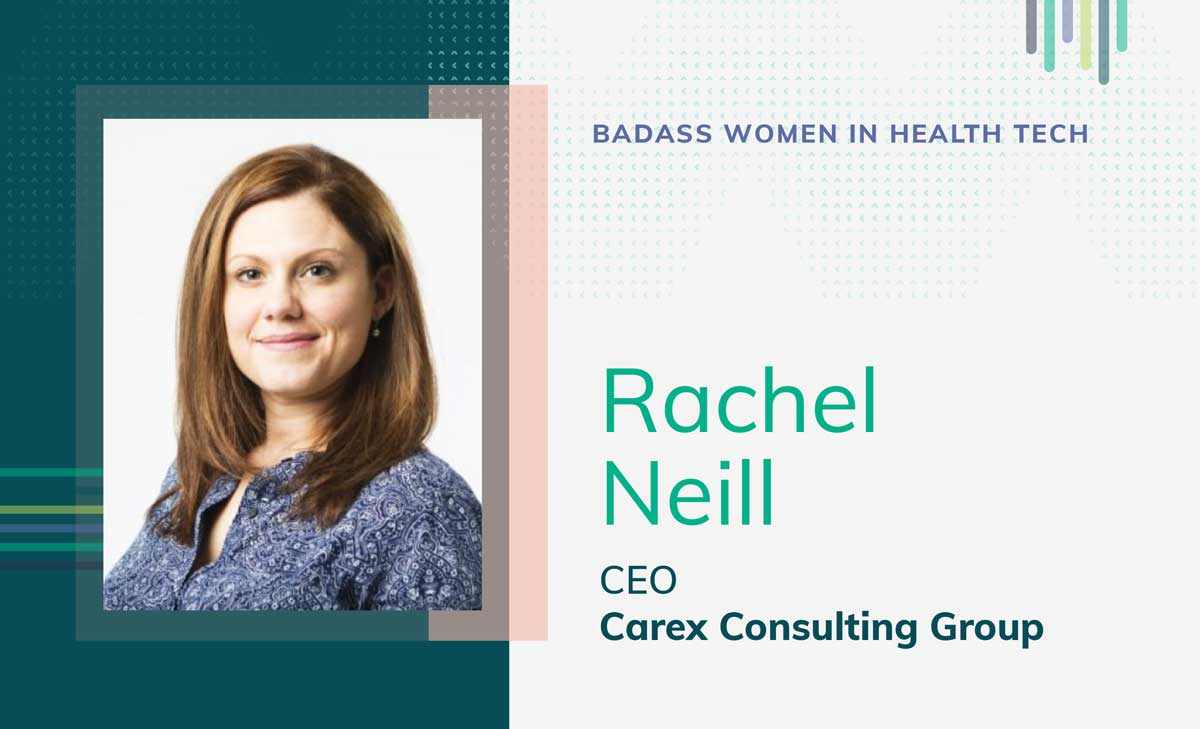Badass women in health tech: Rachel Neill, CEO of Carex Consulting Group
Jan 18, 2017

What does it take to be a successful woman in healthcare technology?
This is a question many of us at Redox have been mulling over lately, so much so that we've decided to reach out to the trailblazers of our young industry and get their thoughts about the answer. We want other women starting out in healthcare to hear their stories and gain some insight into how they can best follow in their footsteps should they be interested in breaking into this emerging field.
Recently, we sat down with Rachel Neill, CEO of Carex Consulting to talk about how she came to be a dynamic female leader in the healthtech field.
Thinking back to the start of your career, was health tech even on your radar? How did you end up ‘here’?
I graduated from The University of Pennsylvania and the Wharton Small Business Development Program; that program was really the catalyst for me wanting to be part of something innovative and encouraged me to think in the context of being an entrepreneur. At that time, I didn’t really know what ‘it’ was, but I knew I wanted the opportunity to make an impact. Healthtech was not really an industry that had materialized, so I started out in a more traditional human-resources-related role. I learned early on that it was on me to own my career and its trajectory. Growing up as a teen mom, I was shunted in the direction of limited opportunity, but knew through drive, persistence, and mentorship, my skills could transfer to a variety of industries.
I never thought about a career in healthtech; I didn’t see enough female role models in the space to know it was a viable career path. I feel fortunate to have landed in the field through working at Epic, based in Madison, WI. Healthtech is one of the biggest emerging industries, but women and minorities are still grossly underrepresented. When we think of women in healthcare, we think of nurses in white uniforms. The complete opposite is true—you’re starting to see more females as business entrepreneurs, developers, consultants, and assuming leadership opportunities. It motivates me each day to learn and lead in this growing healthtech space. Our government-funded initiatives teach vulnerable populations to think “ancillary” care delivery services as the only healthcare options available to them. We save the crème de la crème positions for the well-educated and well-connected. It isn't right.
When you take a three-to-five-year perspective on healthtech, where do you see opportunity?
One of most energizing parts of working in healthtech is the pure velocity in which the companies, technologies, and platforms move. There are monumental shifts and improvements happening constantly. On one hand, that results in an incredible amount of opportunity. Conversely, it also is a reflection of healthtech’s many problems and inefficiencies—it’s really like the Wild West. Can you imagine how long Walmart would be in business if they let you take home stuff and invented the price afterwards? What if Amazon operated as a mail-order catalogue business? In many cases, major healthcare players still operate like it’s an episode of Mad Men. It’s an industry that is being completely revolutionized by the advancement of technology—take a mature industry, add some tech geeks, an influx of software growth and data, and voila, you've got healthtech. This burgeoning industry is where the opportunity lies: healthtech is full of tech savvy, analytical women who have a million and one ways to make medicine smarter, more measurable, and empower patient care.
Carex Consulting… how did it come to be, and why? What do you hope to achieve with it?
The seed was planted early on when I was at the Wharton Small Business Development Program. Of course at the time, I didn’t know how those lessons would materialize in the future, but they're coming to fruition and I’m incredibly excited to find the next great idea over the horizon and ready to take the leap. I truly believe my previous experiences and roles have all led to this venture. As the President of Carex Consulting Group, I hope to be a catalyst for change in the industry. As a female and minority owned business, we want to encourage diversity. To do this successfully, we need more mentors, people who step up and make a conscious effort to guide others that don’t fit the mold. I can’t recall a time when I’ve attended a healthtech event and seen more than a handful of women or people of color. We hope to change the face of the industry in Madison and beyond.
What do you tell minority or female professionals when you’re speaking at events and conferences?
I have been very fortunate to have a great series of mentors in my professional career and one who has been instrumental to my development in the healthtech space. These types of individuals are essential to gaining new perspective on your skills and approaches; they are an important part of your long-term professional success. I truly believe that people ‘want’ to help; it’s how we are built and more so, it's how we grow. Be willing to ask for counsel when you need it, be curious about what you don’t know and align yourself with people who push you beyond your comfort zone. When you find a valuable mentor, value the relationship. Give back to them when you can and extend the lessons learned to others in need; soon, you’ll be filling the rewarding role of mentor to somebody seeking a positive influence.
We sincerely appreciate Rachel for lending her voice to this series and for shining a light on what women can do to break out into this emerging field. For more from Rachel, check out the webinar she and our CTO, James Llloyd recently broadcast, "How to Scale Tech Hiring":
To learn more about Carex Consulting and the services they provide, head over to carexconsultinggroup.com
